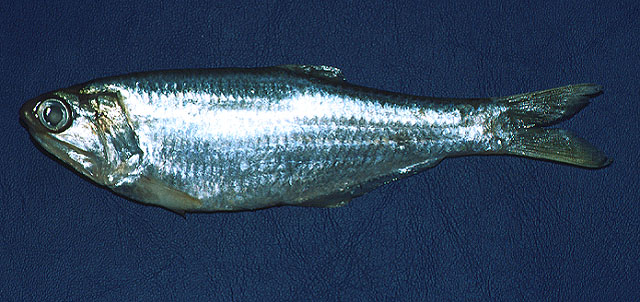| Engraulidae (Anchovies), subfamily: Engraulinae |
| 30 cm TL (male/unsexed) |
|
benthopelagic; brackish; marine; depth range 0 - 50 m, oceanodromous |
| Western Atlantic: in the Antilles, from Cuba and perhaps throughout; Guatemala south and east to Venezuela and Trinidad, south to just north of Rio de Janeiro, Brazil). |
|
Dorsal spines (total): 0-0; Anal spines: 0-0; Anal soft rays: 25-32. Snout short and pointed, tip at about eye center; maxilla moderate, tip pointed and reaching onto pre-operculum (but not beyond), extending beyond second supra-maxilla; sub-operculum with angular hind margin, but not formed into a triangular projection; lower gill rakers increasing in large fishes. Anal fin origin below front few dorsal fin rays. Silver stripe disappearing with age (Ref. 189). |
| Found inshore forming quite large schools and also in estuaries, mangroves and other lagoons, penetrating into almost freshwater (salinities of 4.9-32.25 ppt in Santa Cruz Canal, Pernambuco, Brazil). Feeds by filtering plankton. No data on spawning. |
|
Least Concern (LC); Date assessed: 24 August 2012 Ref. (130435)
|
| harmless |
Source and more info: www.fishbase.org. For personal, classroom, and other internal use only. Not for publication.
